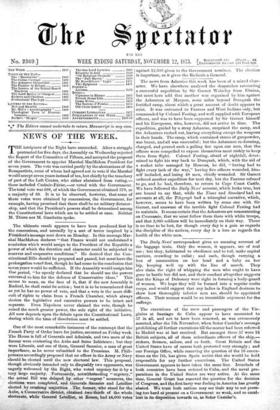The ultimate result appears to have been produced first by
the concessions, and secondly by a sort of terror inspired by a President's message sent down on Monday. In this message Mar- shal MacMahon declares " that France would not understand a resolution which would assign to the President of the Republic a power of which the duration and character could be subjected to reserves and suspensive conditions." He desired that the Con- stitutional Bills should be prepared and passed, but must have the prolongation voted first, though he had come to the conclusion that seven years would be sufficient. If the Assembly would assign him that period, "he openly declared that he should use the powers entrusted to him for the defence of Conservative ideas." This seems to mean, on the face of it, that if the new Assembly is Radical, he shall resist its action ; but it is to be remembered that as yet he has no power of veto, and that a veto is the most diffi- cult of rights to claim from a French Chamber, which always desires the legislative and executive powers to be intact and separate. Even Napoleon never claimed the veto, though he seized the much greater power, the sole right of the initiative. All now depends upon the debate upon the Constitutional Laws, during which the time of dissolution must be settled.


































